- Home
- Lemony Snicket
The Austere Academy Page 3
The Austere Academy Read online
Page 3
But it was none of these punishments that made the Baudelaire orphans pause for so long. It was the fact that they did not know where to sit. Cafeterias can be confusing places, because there are different rules for each one, and sometimes it is difficult to know where one should eat. Normally, the Baudelaires would simply eat with one of their friends, but their friends were far, far away from Prufrock Preparatory School, and Violet, Klaus, and Sunny gazed around the cafeteria full of strangers and thought they might never put down their ugly trays. Finally, they caught the eye of the girl they had seen on the lawn, who had called them such a strange name, and walked a few steps toward her.
Now, you and I know that this loathsome little girl was Carmelita Spats, but the Baude-laires had not been properly introduced to her and so did not realize just how loathsome she was, although as the orphans drew closer she gave them an instant education.
"Don't even think of eating around here, you cakesniffers!" Carmelita Spats cried, and several of her rude, filthy, violent friends nodded in agreement. "Nobody wants to have lunch with people who live in the Orphans Shack!"
"I'm terribly sorry," Klaus said, although he wasn't terribly sorry at all. "I didn't mean to disturb you."
Carmelita, who had apparently never been to the administrative building, picked up her silverware and began to bang it on her tray in a rhythmic and irritating way. "Cakesniffing orphans in the Orphans Shack! Cakesniffing orphans in the Orphans Shack!" she chanted, and to the Baudelaires' dismay, many other children joined right in. Like many other rude, violent, filthy people, Carmelita Spats had a bunch of friends who were always happy to help her torment people-probably to avoid being tor-mented themselves. In a few seconds, it seemed like the entire cafeteria was banging their silverware and chanting, "Cakesniffing orphans in the Orphans Shack!" The three siblings stepped closer together, craning their necks to see if there was any possible place to which they could escape and eat their lunch in peace.
"Oh, leave them alone, Carmelita!" a voice cried over the chanting. The Baudelaires turned around and saw a boy with very dark hair and very wide eyes. He looked a little older than Klaus and a little younger than Violet and had a dark green notebook tucked into the pocket of his thick wool sweater. "You're the cakesniffer, and nobody in their right mind would want to eat with you anyway. Come on," the boy said, turning to the Baudelaires. "There's room at our table."
"Thank you very much," Violet said in relief and followed the boy to a table that had plenty of room. He sat down next to a girl who looked absolutely identical to the boy. She looked about the same age, and also had very dark hair, very wide eyes, and a notebook tucked into the pocket of her thick wool sweater. The only difference seemed to be that the girl's notebook was pitch black. Seeing two people who look so much alike is a little bit eerie, but it was better than looking at Carmelita Spats, so the Baudelaires sat down across from them and introduced themselves.
"I'm Violet Baudelaire," said Violet Baudelaire, "and this is my brother, Klaus, and our baby sister, Sunny."
"It's nice to meet you," said the boy. "My name is Duncan Quagmire, and this is my sister, Isadora. And the girl who was yelling at you, I'm sorry to say, was Carmelita Spats."
"She didn't seem very nice," Klaus said.
"That is the understatement of the century," Isadora said. "Carmelita Spats is rude, filthy, and violent, and the less time you spend with her the happier you will be."
"Read the Baudelaires the poem you wrote about her," Duncan said to his sister.
"You write poetry?" Klaus asked. He had read a lot about poets but had never met one.
"Just a little bit," Isadora said modestly. "I write poems down in this notebook. It's an interest of mine."
"Sappho!" Sunny shrieked, which meant something like "I'd be very pleased to hear a poem of yours!"
Klaus explained to the Quagmires what Sunny meant, and Isadora smiled and opened her notebook. "It's a very short poem," she said. "Only two rhyming lines."
"That's called a couplet," Klaus said. "I learned that from a book of literary criticism."
"Yes, 1 know," Isadora said, and then read her poem, leaning forward so Carmelita Spats would not overhear:
"I would rather eat a bowl of vampire bats
than spend an hour with Carmelita Spats."
The Baudelaires giggled and then covered their mouths so nobody would know they were laughing at Carmelita. "That was great," Klaus said. "I like the part about the bowl of bats."
"Thanks," Isadora said. "I would be interested in reading that book of literary criticism you told me about. Would you let me borrow it?"
Klaus looked down. "I can't," he said. "That book belonged to my father, and it was destroyed in a fire."
The Quagmires looked at one another, and their eyes grew even wider. "I'm very sorry to hear that," Duncan said. "My sister and I have been through a terrible fire, so we know what that's like. Did your father die in the fire?"
"Yes he did," Klaus said, "and my mother too."
Isadora put down her fork, reached across the table, and patted Klaus on the hand. Normally this might have embarrassed Klaus a little bit, hut under the circumstances it felt perfectly natural. "I'm so sorry to hear that," she said. "Our parents died in a fire as well. It's awful to miss your parents so much, isn't it?"
"Bloni," Sunny said, nodding.'"
"For a long time," Duncan admitted, "I was afraid of any kind of fire. I didn't even like to look at stoves."
Violet smiled. "We stayed with a woman for a while, our Aunt Josephine, who was afraid of stoves. She was afraid that they might explode."
"Explode!" Duncan said. "Even I wasn't afraid as all that. Why aren't you staying with your Aunt Josephine now?"
Now it was Violet's turn to look down, and Duncan's turn to reach across the table and take her hand. "She died too," Violet said. "To tell you the truth, Duncan, our lives have been very topsy-turvy for quite some time."
"I'm very sorry to hear it," Duncan said, "and I wish I could tell you that things will get better here. But between Vice Principal Nero playing the violin, Carmelita Spats teasing us, and the dreadful Orphans Shack, Prufrock Prep is a pretty miserable place."
"I think it's awful to call it the Orphans Shack," Klaus said. "It's a bad enough place without giving it an insulting nickname."
"The nickname is more of Carmelita's handiwork, I'm sorry to say," Isadora said. "Duncan and I had to live there for three semesters because we needed a parent or guardian to sign our permission slip, and we didn't have one."
"That's the same thing that happened to us!" Violet cried. "And when we asked Nero to make an exception-"
"He said he was too busy practicing the violin," Isadora said, nodding as she finished Violet's sentence. "He always says that. Anyway, Carmelita called it the Orphans Shack when we were living there, and it looks like she's going to keep on doing it."
"Well," Violet sighed, "Carmelita's nasty names are the least of our problems in the shack. How did you deal with the crabs when you lived there?"
Duncan let go of her hand to take his notebook out of his pocket. "I use my notebook to take notes on things," he explained. "I plan to be a newspaper reporter when I get a little older and I figure it's good to start practicing. Here it is: notes on the crabs. They're afraid of loud noises, you see, so I have a list of things we did to scare them away from us."
"Afraid of loud noises," Violet repeated, and tied her hair up in a ribbon to keep it out of her eyes.
"When she ties her hair up like that," Klaus explained to the Quagmires, "it means she's thinking of an invention. My sister is quite an inventor."
"How about noisy shoes?" Violet said suddenly. "If we took small pieces of metal and glued them to our shoes? Then wherever we walked would make a loud noise, and I bet we'd hardly ever see those crabs."
"Noisy shoes!" Duncan cried. "Isadora and I lived in the Orphans Shack all that time and never thought of noisy shoes!" He took a pencil out of his p
ocket and wrote "noisy shoes" in the dark green notebook, and then turned a page. "I do have a list of fungus books that are in the school library, if you need help with that tan stuff on the ceiling."
"Zatwal!" Sunny shrieked.
"We'd love to see the library," Violet translated. "It sure is lucky that we ran into you two twins."
Duncan's and Isadora's faces fell, an expression which does not mean that the front part of their heads actually fell to the ground. It simply means that the two siblings suddenly looked very sad.
"What's wrong?" Klaus asked. "Did we say something that upset you?"
"Twins," Duncan said, so softly that the Baudelaires could barely hear him.
"You are twins, aren't you?" Violet asked. "You look just alike."
"We're triplets," Isadora said sadly.
"I'm confused," Violet said. "Aren't triplets three people born at the same time?"
"We were three people born at the same time," Isadora explained, "but our brother, Quigley, died in the fire that killed our parents."
"I'm very sorry to hear that," Klaus said. "Please forgive our calling you twins. We meant no disrespect to Quigley's memory."
"Of course you didn't," Duncan said, giving the Baudelaires a small smile. "There's no way you could have known. Come on, if you're done with your lasagna we'll show you the library."
"And maybe we can find some pieces of metal," Isadora said, "for noisy shoes."
The Baudelaire orphans smiled, and the five of them bussed their trays and walked out of the cafeteria. The library turned out to be a very pleasant place, but it was not the comfortable chairs, the huge wooden bookshelves, or the hush of people reading that made the three siblings feel so good as they walked into the room. It is useless for me to tell you all about the brass lamps in the shapes of different fish, or the bright blue curtains that rippled like water as a breeze came in from the window, because although these were wonderful things they were not what made the three children smile. The Quagmire triplets were smiling, too, and although I have not researched the Quagmires nearly as much as I have the Baudelaires, I can say with reasonable accuracy that they were smiling for the same reason.
It is a relief, in hectic and frightening times, to find true friends, and it was this relief that all five children were feeling as the Quagmires gave the Baudelaires a tour of the Prufrock Library. Friends can make you feel that the world is smaller and less sneaky than it really is, because you know people who have similar experiences, a phrase which here means "having lost family members in terrible fires and lived in the Orphans Shack." As Duncan and Isadora whispered to Violet, Klaus, and Sunny, explaining how the library was organized, the Baudelaire children felt less and less distressed about their new circumstances, and by the time Duncan and Isadora were recommending their favorite books, the three siblings thought that perhaps their troubles were coming to an end at last. They were wrong about this, of course, but tor the moment it didn't matter. The Baudelaire orphans had found friends, and as they stood in the library with the Quagmire triplets, the world felt smaller and safer than it had for a long, long time.
CHAPTER Four
If you have walked into a museum recently- whether you did so to attend an art exhibition in to escape from the police-you may have noticed a type of painting known as a triptych. A triptych has three panels, with something different painted on each of the panels. For instance, my friend Professor Reed made a trip-tych for me, and he painted fire on one panel, a typewriter on another, and the face of a beautiful, intelligent woman on the third. The triptych is entitled What Happened to Beatrice and I cannot look upon it without weeping.
I am a writer, and not a painter, but if I were to try and paint a triptych entitled The Baudelaire Orphans' Miserable Experiences at Prufrock Prep, I would paint Mr. Remora on one panel, Mrs. Bass on another, and a box of staples on the third, and the results would make me so sad that between the Beatrice triptych and the Baudelaire triptych I would scarcely stop weeping all day.
Mr. Remora was Violet's teacher, and he was so terrible that Violet thought that she'd almost rather stay in the Orphans Shack all morning and eat her meals with her hands tied behind her back rather than hurry to Room One and learn from such a wretched man. Mr. Remora had a dark and thick mustache, as if somebody had chopped off a gorilla's thumb and stuck it above Mr. Remora's lip, and also like a gorilla, Mr. Remora was constantly eating bananas. Bananas are a fairly delicious fruit and contain a healthy amount of potassium, but after watching Mr. Remora shove banana after banana into his mouth, dropping banana peels on the floor and smearing banana pulp on his chin and in his mustache, Violet never wanted to see another banana again. In between bites of banana, Mr. Remora would tell stories, and the children would write the stories down in notebooks, and every so often there would be a test. The stories were very short, and there were a whole lot of them on every conceivable subject. "One day I went to the store to purchase a carton of milk," Mr. Remora would say, chewing on a banana. "When I got home, I poured the milk into a glass and drank it. Then I watched television. The end." Or: "One after noon a man named Edward got into a green truck and drove to a farm. The farm had geese and cows. The end." Mr. Remora would tell story after story, and eat banana after banana, and it would get more and more difficult for Violet to pay attention. To make things better, Duncan sat next to Violet, and they would pass notes to one another on particularly boring days. But to make things worse, Carmelita Spats sat right behind Violet, and every few minutes she would lean forward and poke Violet with a stick she had found on the lawn. "Orphan," she would whisper and poke Violet with the stick, and Violet would lose her concentration and forget to write down some detail of Mr. Remora's latest story.
Across the hall in Room Two was Klaus's teacher Mrs. Bass, whose black hair was so long and messy that she also vaguely resembled a gorilla. Mrs. Bass was a poor teacher, a phrase which here does not mean "a teacher who doesn't have a lot of money" but "a teacher who is obsessed with the metric system." The metric system, you probably know, is the system by which the majority of the world measures things. Just as it is perfectly all right to eat a banana or two, it is perfectly all right to be interested in measuring things. Klaus could remember a time, when he was about eight years old, when he had measured the width of all the doorways in the Baudelaire mansion when he was bored one rainy afternoon. But rain or shine, all Mrs. Bass wanted to do was measure things and write down the measurements on the chalkboard. Each morning, she would walk into Room Two carrying a bag full of ordinary objects-a frying pan, a picture frame, the skeleton of a cat-and place an object on each student's desk. "Measure!" Mrs. Bass would shout, and everybody would take out their rulers and measure whatever it was that their teacher had put on their desks. They would call out the measurements to Mrs. Bass, who would write them on the board and then have everybody switch objects. The class would continue on in this way for the entire morning, and Klaus would feel his eyes glaze over-the phrase "glaze over" here means "ache slightly out of boredom." Across the room, Isadora Quagmire's eyes were glazing over too, and occasionally the two of them would look at one another and stick their tongues out as if to say, Mrs. Bass is terribly boring, isn't she?
But Sunny, instead of going into a classroom, had to work in the administrative building, and I must say that her situation was perhaps the worst in the entire triptych. As Vice Principal Nero's secretary, Sunny had numerous duties assigned to her that were simply impossible for a baby to perform. For instance, she was in charge of answering the telephone, but people who called Vice Principal Nero did not always know that "Seltepia!" was Sunny's way of saying "Good morning, this is Vice Principal Nero's office, how may I help you?" By the second day Nero was furious at her for confusing so many of his business associates. In addition, Sunny was in charge of typing, stapling, and mailing all of Vice Principal Nero's letters, which meant she had to work a typewriter, a stapler, and stamps, all of which were designed for adult use. Unlike many babies, S
unny had some experience in hard work-after all, she and her siblings had worked for some time at the Lucky Smells Lumbermill-but this equipment was simply inappropriate for such liny fingers. Sunny could scarcely move the typewriter's keys, and even when she could she did not know how to spell most of the words Nero dictated. She had never used a stapler before, so she sometimes stapled her fingers by mistake, which hurt quite a bit. And occasionally one of the stamps would stick to her tongue and wouldn't come off.
In most schools, no matter how miserable, the students have a chance to recuperate during the weekend, when they can rest and play instead of attending wretched classes, and the Baudelaire orphans looked forward to taking a break from looking at bananas, rulers, and secretarial supplies. So they were quite distressed one Friday when the Quagmires informed them that Prufrock Prep did not have weekends. Saturday and Sunday were regular schooldays, supposedly in keeping with the school's motto. This rule did not really make any sense-it is, after all, just as easy to remember you will die when you are relaxing as when you are in school-but that was the way things were, so the Baudelaires could never remember exactly what day it was, so repetitive was their schedule. So I am sorry to say that I cannot tell you what day it was when Sunny noticed that the staple supply was running low, but I can tell you that Nero informed her that because she had wasted so much time learning to be a secretary he would not buy any more when they ran out. Instead Sunny would have to make staples herself, out of some skinny metal rods Nero kept in a drawer.
"That's ridiculous!" Violet cried when Sunny told her of Nero's latest demand. It was after dinner, and the Baudelaire orphans were in the Orphans Shack with the Quagmire triplets, sprinkling salt at the ceiling. Violet had found some pieces of metal behind the cafeteria and had fashioned five pairs of noisy shoes: three for the Baudelaires and two for the Quagmires so the crabs wouldn't bother them when they visited the Orphans Shack. The problem of the tan fungus, however, was yet to be solved. With Duncan's help, Klaus had found a book on fungus in the library and had read that salt might make this particular fungus shrivel up. The Quagmires had distracted some of the masked cafeteria workers by dropping their trays on the ground, and while Nero yelled at them for making a mess, the Baudelaires had slipped three saltshakers into their pockets. Now, in the brief recess after dinner, the five children were sitting on bales of hay, trying to toss salt onto the fungus and talking about their day.

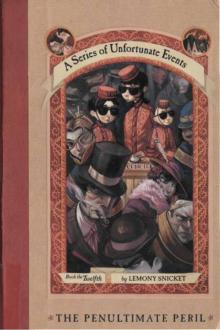 The Penultimate Peril
The Penultimate Peril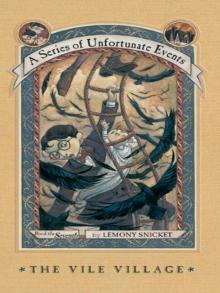 The Vile Village
The Vile Village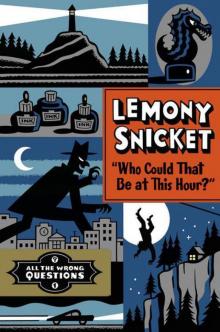 Who Could That Be at This Hour?
Who Could That Be at This Hour?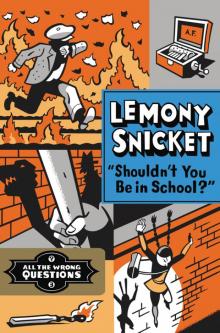 Shouldn't You Be in School?
Shouldn't You Be in School?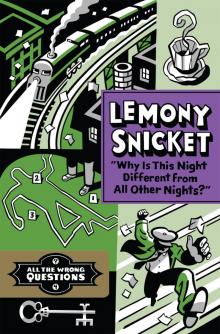 Why Is This Night Different From All Other Nights?
Why Is This Night Different From All Other Nights?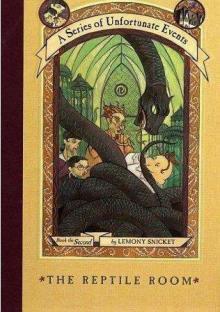 The Reptile Room
The Reptile Room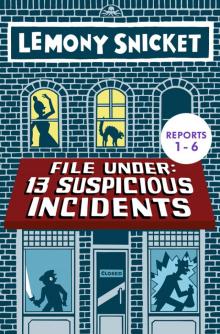 File Under: 13 Suspicious Incidents (1-6)
File Under: 13 Suspicious Incidents (1-6) The End
The End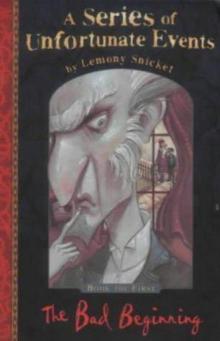 The Bad Beginning
The Bad Beginning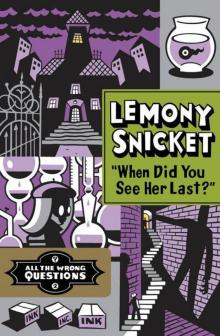 When Did You See Her Last?
When Did You See Her Last?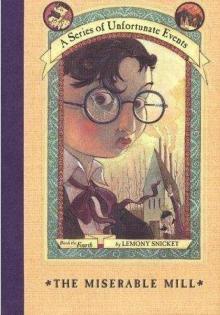 The Miserable Mill
The Miserable Mill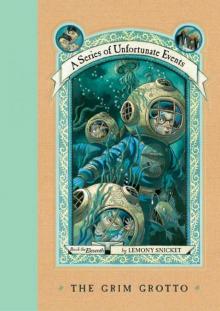 The Grim Grotto
The Grim Grotto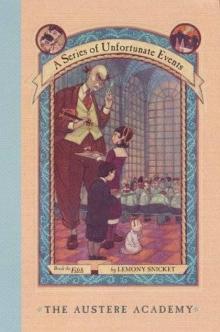 The Austere Academy
The Austere Academy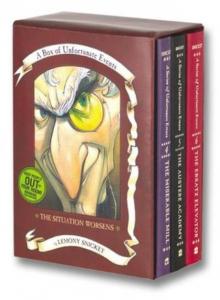 The Ersatz Elevator
The Ersatz Elevator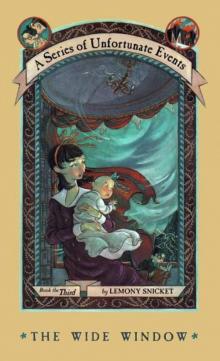 The Wide Window
The Wide Window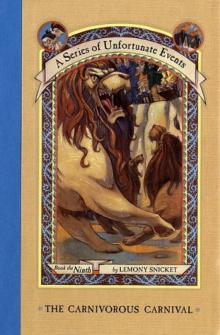 The Carnivorous Carnival
The Carnivorous Carnival A Series of Unfortunate Events Box: The Complete Wreck
A Series of Unfortunate Events Box: The Complete Wreck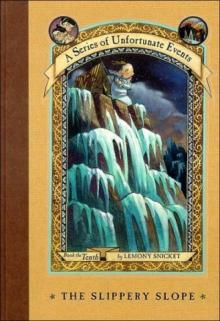 The Slippery Slope
The Slippery Slope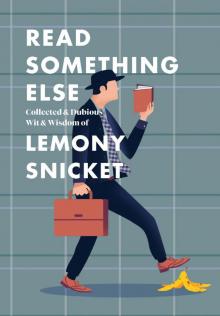 Read Something Else
Read Something Else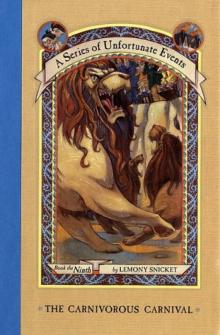 The Carnivorous Carnival asoue-9
The Carnivorous Carnival asoue-9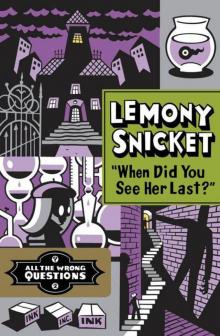 When Did You See Her Last
When Did You See Her Last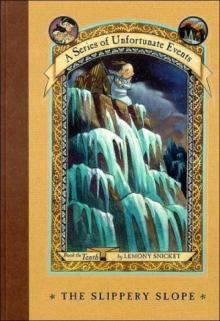 The Slippery Slope asoue-10
The Slippery Slope asoue-10 The Hostile Hospital asoue-8
The Hostile Hospital asoue-8 A Series of Unfortunate Events Collection: Books 1-13 with Bonus Material
A Series of Unfortunate Events Collection: Books 1-13 with Bonus Material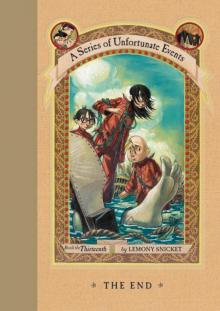 The End asoue-13
The End asoue-13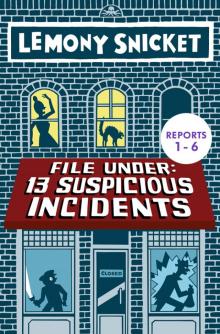 File Under
File Under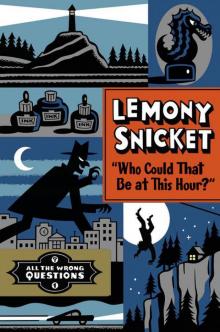 Who Could That Be at This Hour? (All the Wrong Questions)
Who Could That Be at This Hour? (All the Wrong Questions)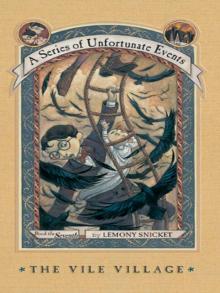 The Vile Village asoue-7
The Vile Village asoue-7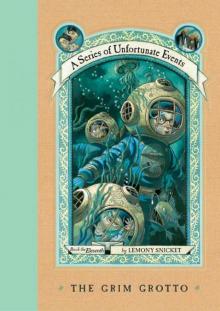 The Grim Grotto asoue-11
The Grim Grotto asoue-11